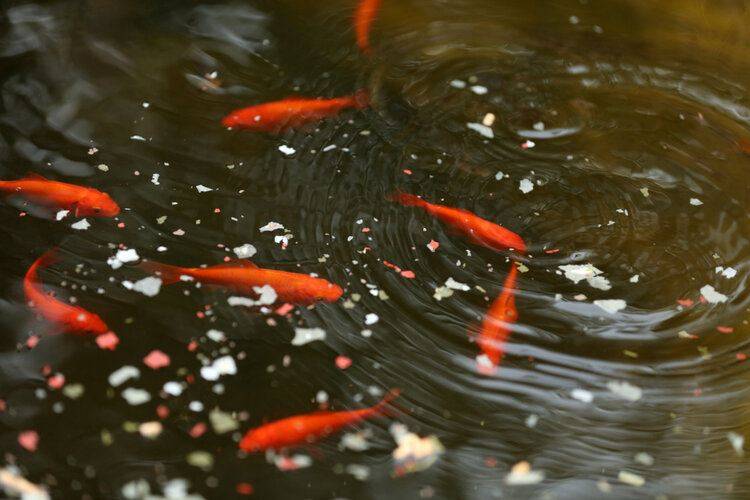
Goldfish are popular and beloved pets known for their vibrant colors and graceful swimming. As responsible fish owners, it’s important to provide them with a balanced and nutritious diet. While goldfish typically thrive on a diet of commercial fish food and occasional treats, some fish owners wonder if goldfish can eat garlic. Let’s explore this question in more detail.

Can Goldfish Eat Garlic?
Garlic is a commonly used ingredient in human cuisine and is known for its distinct aroma and flavor. It also has some potential health benefits, including antibacterial properties and immune system support. However, when it comes to goldfish, the relationship between garlic and their diet is a bit more complicated.
In general, goldfish do not require garlic as a part of their regular diet. Goldfish are omnivorous and can derive their nutritional needs from a variety of sources, including commercial fish food specially formulated for them. These fish foods are designed to provide a balanced diet that meets their nutritional requirements. They typically contain a mix of proteins, carbohydrates, vitamins, and minerals necessary for the health and well-being of goldfish.
While garlic is not toxic to goldfish in small amounts, it is not a natural part of their diet. Some fish owners believe that adding garlic to goldfish’s food can enhance their appetite and help prevent diseases. There is limited scientific evidence to support these claims specifically for goldfish. However, garlic is known to have antimicrobial properties and may have some benefits in reducing the risk of certain diseases in fish.
If you wish to introduce garlic into your goldfish’s diet, it is essential to exercise caution and moderation. Start by mincing a small amount of fresh garlic and mixing it with their regular fish food. It’s crucial to ensure that the garlic is thoroughly minced to avoid any choking hazards for the goldfish. Observe your goldfish closely for any adverse reactions or changes in behavior after consuming the garlic-infused food.
Remember that moderation is key. Garlic should only be given as an occasional treat and not as a staple part of their diet. It is always recommended to consult with a veterinarian or a knowledgeable aquatic specialist before making any significant changes to your goldfish’s diet or introducing new foods.
In conclusion, goldfish do not require garlic as a part of their regular diet. While small amounts of garlic can be safely introduced as an occasional treat, it is not necessary for their overall health and well-being. As responsible fish owners, it’s crucial to provide them with a balanced diet that is specifically formulated for their nutritional needs. If you have any concerns or questions about your goldfish’s diet, consult with a professional who can provide expert advice tailored to your goldfish’s individual needs.
5 Feeding Tips for Healthy Goldfish
Feeding goldfish properly is crucial for their overall health and well-being. Here are five feeding tips to help ensure your goldfish stay healthy:
- Use a High-Quality Goldfish Food: Choose a high-quality commercial fish food specifically formulated for goldfish. Look for brands that offer a balanced diet with a mix of proteins, carbohydrates, vitamins, and minerals. Avoid feeding them foods intended for other types of fish, as their nutritional needs may differ.
- Feed the Right Amount: Overfeeding can lead to health problems such as obesity and poor water quality. Goldfish have small stomachs and can easily become overfed. Feed them small amounts of food two to three times a day, only giving them what they can consume within a few minutes. If there is excess food leftover, remove it to maintain water cleanliness.
- Offer Variety: Goldfish benefit from a varied diet. Supplement their staple fish food with occasional treats such as frozen or live foods like bloodworms, daphnia, or brine shrimp. You can also offer them small pieces of blanched vegetables like peas, zucchini, or spinach. Varying their diet not only adds nutritional variety but also stimulates their natural foraging behavior.
- Avoid Overuse of Dry Flakes: While dry fish flakes are a common choice for goldfish, they can sometimes cause bloating and swim bladder issues. To prevent these problems, soak the flakes in water for a few minutes before feeding, allowing them to expand and become easier to digest. Alternatively, you can opt for sinking pellets or gel-based foods that reduce the risk of air ingestion.
- Maintain Clean Water: Proper water quality is essential for the health of your goldfish. Uneaten food can quickly degrade water quality, leading to ammonia and nitrite buildup. To avoid this, remove any uneaten food after feeding. Regularly test the water parameters and perform partial water changes to keep the environment clean and conducive to your goldfish’s well-being.
Remember to observe your goldfish closely for any signs of overfeeding or nutritional deficiencies. If you have any concerns about their diet or health, consult with a veterinarian or an aquatic specialist for personalized advice and recommendations.
By following these feeding tips, you can provide your goldfish with a nutritious and varied diet, helping them thrive and enjoy a healthy life in their aquatic habitat.
Why is my parakeet puffed up and shaking?
Are Lubber Grasshoppers Poisonous To Dogs?
Can My Baby Eat Laughing Cow Cheese?
You have twice as many female ancestors as male ancestors
Why Does My Poop Smell Like Cow Manure?
Why Do Some Grey Squirrels Have Blonde Tails?
Are Dogs Allowed In Kmart Australia?
